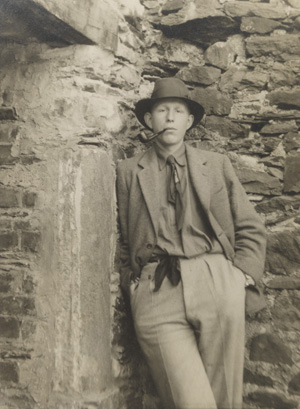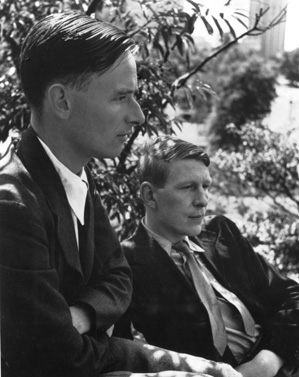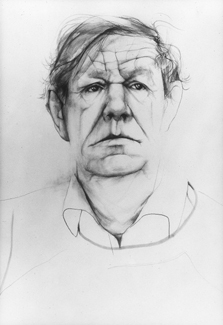W.
H. Auden
Auden in Austria |

W.H. Auden
Wescoe, near Threlkeld, Cumbria
(1928)
Auden's parents had a holiday home in the hamlet
Bromide print, 1928, John Bicknell Auden
© Estate of John Bicknell Auden |
One
of the 20th
century's major
literary figures,
W.H.
Auden spent much of his later life in Austria.
From 1958-73 Auden summered at his farmhouse in Kirchstetten
near Vienna.
He died in the Austrian capital on 29th September 1973 and is
buried in the cemetery at Kirchstetten. |
To
save your world you asked this man to die:
Would this man, could he see you now, ask why? |
| Epitath
for the Unknown Soldier (1955) |
|
In her 1975 article Remembering
W.H. Auden in The New
Yorker, Hannah Arendt quotes
the following conversation between a young Auden and his tutor
at Oxford...
“Tutor:
‘And what are you going to do, Mr. Auden, when you leave
the university?’
Auden: ‘I am going to be
a poet.’
Tutor: ‘Well—in that
case you should find it very useful to have read English.’
Auden: ‘You don’t understand.
I am going to be a great poet.’ ”
|
|

W.H. Auden and Christopher Isherwood
Central Park, New York
(July 1938)
In January 1939 both writers immigrated to the U.S.
Toned bromide print, 1938, Louise Dahl-Wolfe
© Smith Archive / Alamy Stock Foto
Top |
| Early
life | Immigration to the US |
Born in York in 1907, Wystan Hugh Auden rose to prominence
with poetry chronicling the political and social upheavals of
the years leading up to World War II.
Auden studied at Christ Church College, Oxford University
meeting his contemporaries Stephen Spender, Cecil Day-Lewis
and Louis MacNeice and also Christopher Isherwood who
he had been at school with and with whom he would later travel
and collaborate.
On graduating in 1928 he spent a year in Berlin (not
Paris like many writers of the time), developing a lifelong
love for the German language and being influenced by Bertolt
Brecht. Isherwood joined Auden in the German capital and
when Auden returned to England Isherwood stayed on, writing
about his experiences in Goodbye to Berlin.
Auden married Erika Mann in 1935, enabling the daughter
of Thomas Mann to get a British passport and leave Nazi Germany.
Despite being a marriage of convenience, they were still married
when Mann died thirty-four years later.
In January 1939 Auden and Isherwood immigrated to the United
States (at the time a controversial decision in a
Britain facing the possibility of war). Auden settled in New
York and Isherwood travelled on to Los Angeles. They both became
US citizens.
|
|
The stars are not wanted now; put out
every one;
Pack up the moon and dismantle the sun;
Pour away the ocean and sweep up the wood;
For nothing now can ever come to any good.
|
| Funeral
Blues/Stop All the Clocks (1936) |
|
| Accolades
| Summers in Europe |
Auden was awarded the Pulitzer
Prize in 1948 for his era-defining The Age of Anxiety
and in 1956 he received a National Book Award for The
Shield of Achilles.
From 1948 Auden spent his summers
on the island of Ischia off Naples and from 1958 in the village
of Kirchstetten,
an hour's train journey west of Vienna. Due to his interest
in German literature he wanted to spend his summers in a German-speaking
country and be near an opera. With the help of Austrian friends
he knew through his visits to the Salzburg Festival he bought
a small farmhouse which would hold a special meaning for him:
it was the only property he ever owned. Bought with the award
money from winning the Feltrinelli Prize the previous
year, Auden was said to have been moved to tears when it was
purchased.
He was elected Professor of Poetry at Oxford in 1956,
taking over the post from Cecil Day-Lewis. Five years later
Robert Graves succeeded him.
On the death of the U.S. poet T.S.
Eliot in 1965, Auden was considered by many to be his successor
as the foremost poet working in the English language (a status
conferred on Eliot after the death of Yeats).
|

W.H. Auden
(February 1956)
Press photo on the occasion of being awarded the Pulitzer
Prize for "The Shield of Achilles"
1956, George Cserna
© Granger Historical Picture Archive / Alamy Stock Foto
Top
|
At
the far end of the enormous room
An orchestra is playing to the rich. |
| At
the Far End of the Enormous Room (1933) |
|

W.H. Auden
(1967)
Pen and ink, 1967, Don Bachardy
© Granger Historical Picture Archive / Alamy Stock Foto
|
| Return
to England | Vienna |
Failing health led Auden to leave New York in 1972. He returned
to Europe to spend his winters in England, moving into a cottage
in the grounds of Christ Church College at Oxford University
where he had once studied.
Having spent the following summer in his farmhouse in Kirchstetten,
on 28th September 1973 Auden held a poetry recital at the Palais
Palffy on Josefsplatz in the Old Town of Vienna. He
returned to his nearby hotel to fly to England the next day
but died
during the night.
Auden
has a memorial in Poets'
Corner in Westminster Abbey but he was buried at the cemetery
in Kirchstetten.
According to The Guardian the funeral took place
on a "fine clear" day (October 4th) and was attended
by a hundred local people mingled with twenty visitors from
the US and England, including Stephen Spender, Auden's brother
John and Sonia Orwell (the widow of George Orwell). Christopher
Isherwood, still living in Los Angeles, was not able to attend.
|
Today a small museum
can be visited in his former summer home in the village.
|
|

The house where Auden spent
his summers from 1958 to 1973
(January 2025)
|

The church where Auden is buried
(January 2025)
Top |
|
I'll love you till the ocean
Is folded and hung up to dry
And the seven stars go squawking
Like geese about the sky
|
| As
I Walked Out One Evening (1940) |
|
| |
Sources
Drabble, M.
(Ed.) (1995). Oxford Companion to English Literature.
Oxford: Oxford University Press
Various (Eds.) (1995). Merriam-Webster's Encyclopedia of
Literature. Springfield: Merriam-Webster
The W.H.
Auden Society. Retrieved 22.01.2022
from https://www.audensociety.org/
The Academy of American Poets.
Retrieved 22.01.2022 from
https://poets.org/
The Poetry Foundation.
Retrieved 22.01.2022 from https://www.poetryfoundation.org/
|
| |
Top |

